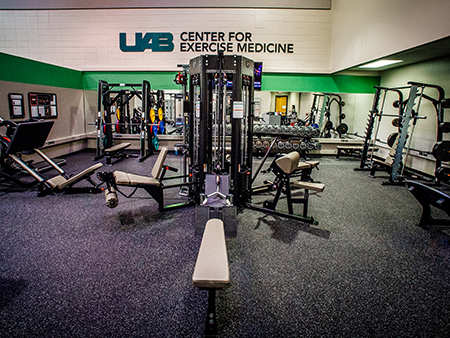 Participants in the study will have access to UAB's Center for Exercise Medicine facility.The benefits of exercise on health are well known, and now researchers at the University of Alabama at Birmingham are exploring a potential new role for exercise: improving memory in people with idiopathic generalized epilepsy.
Participants in the study will have access to UAB's Center for Exercise Medicine facility.The benefits of exercise on health are well known, and now researchers at the University of Alabama at Birmingham are exploring a potential new role for exercise: improving memory in people with idiopathic generalized epilepsy.
“Approximately half of the 3.4 million persons with epilepsy in the United States have cognitive problems, and memory deficits are the most common,” said Jane Allendorfer, Ph.D., an assistant professor in the Department of Neurology, UAB Heersink School of Medicine. “Recent studies have shown that formal exercise training can help with memory in healthy individuals. We have reason to believe exercise can help boost memory in people with epilepsy, too.”
Allendorfer and her team at UAB will enroll 114 persons with idiopathic generalized epilepsy between the ages of 18 and 55. The study is funded by a $3.1 million, five-year grant from the National Center for Medical Rehabilitation Research, part of the National Institute of Child Health and Human Development at the National Institutes of Health.
A previously completed pilot study of 16 people demonstrated memory improvement following supervised combined endurance and resistance training.
Half of the participants in the new study will be randomized to immediately undergo supervised endurance and resistance training three times a week for six weeks at the UAB Center for Exercise Medicine’s Exercise Clinical Trials Facility, while the other half will have a six-week delay prior to exercising.
Improvements in memory in the immediate exercise group will be assessed and compared to the delayed exercise control group (the control group will also undergo endurance and resistance training for six weeks). All participants will be followed for an additional six weeks.
 Jane Allendorfer, Ph.D.“Exercise provides beneficial effects for the entire body, and certainly that includes the brain as well,” Allendorfer said. “Exercise appears to boost blood flow in the brain, and we know that functional connectivity between brain regions changes with exercise. Improved connectivity may result in improved memory.”
Jane Allendorfer, Ph.D.“Exercise provides beneficial effects for the entire body, and certainly that includes the brain as well,” Allendorfer said. “Exercise appears to boost blood flow in the brain, and we know that functional connectivity between brain regions changes with exercise. Improved connectivity may result in improved memory.”
Participants will have three or four study visits in addition to the exercise sessions. Study visits will include a physical exam to determine whether a participant can safely exercise. Visits, which will be reimbursed, also include an MRI scan at the UAB Research MRI Core.
The investigators will employ the California Verbal Learning Test to help evaluate memory improvement. The test, widely used in clinical neuropsychological assessment and research, measures episodic verbal learning and memory.
“The options for combating memory impairment in persons with epilepsy are limited,” Allendorfer said. “As the effects of exercise on memory in this patient population are largely unknown, this study could have a significant impact on the use of exercise for memory rehabilitation.”
Those interested in participating in the study may call the study coordinator at 205-975-8446.
